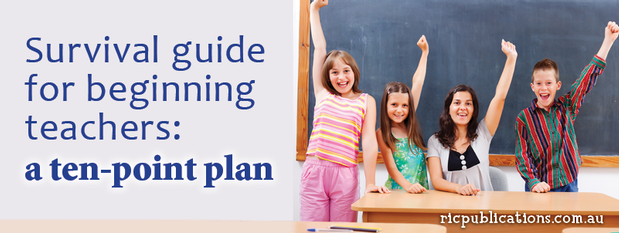- Tuesday 12 July 2016
- 0 Comments
This article by Andrea Doyle is taken from Class ideas K-3 Issue #76.
You thought your in-class practicals prepared you for teaching—but now you’re in control of a class of 20+ students. Stay calm, sit down and have a read of Teaching made easy’s Andrea Doyle’s guide for beginning teachers.
1. Enjoy your work!
Your enthusiasm and enjoyment in the classroom will transfer to your students. Love what you do! Relax—becoming a great teacher takes time, so don’t be too hard on yourself!
2. Get to know your students well!
Spend time in the first weeks to buiild a relationship between yourself and your students. Play lots of games and work to develop good social skills, including conflict resolution and co-operative group skills.
Your relationship with parents is very important. They know their children well, so listen to them about their child’s interests, needs and abilities. Organise referrals and support for students with special needs early, as this can be a long process.
3. Be firm, fair and have fun!
Set up typical classroom routines, and maintain high expectations for classroom behaviour and learning, but allow yourself to have fun and joke with your students, too.
4. Principals are people too!
Approach your line manager, principal or deputy with any concerns. The school leadership staff is there to help you to do your job.
5. Ask for help and advice!
There is no such thing as a silly question! Ask as many questions as you can. Appreciate the front office staff and school support officers ... they are your angels! Ask other teachers what works for them. Ask several teachers and then do what works for you.
6. Be thoroughly organised!
Maintain a thorough program. Carry a diary to all staff meetings and write in special events, days and holidays so you can include these in your planning. Design and display your timetable. This will help children know what is coming next in the school day and will also help others find you if you are out of the classroom. Find quick and easy ways to assess and collect records of student learning, like checklists and photos. This will help when it comes to report writing.
7. Be flexible!
Prepare to be flexible. In the school environment your best-laid plans will almost always need to be changed. Learn to adapt.
8. Share the load!
Delegate tasks where you can. Not only to school support staff, but your students and their parents are often only too willing to help.
9. Find a balance!
There will always be more that you can do. Ensure you avoid teacher stress by maintaining a balance between school life and home life.
10. Save time where you can!
You can start by subscribing to Teaching Made Easy Print. Download and print various classroom needs at one convenient website. All the work has been done for you! Your colourful, welcoming classroom will be the envy of other teachers! Send photos of them to www.teachingmadeeasyprint.com.au.
Do you have any tips for beginning teachers? A way to conquer the nerves? We'd love to read about them in the comments below!
